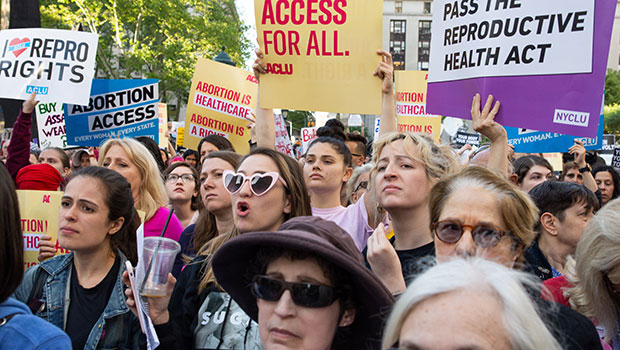#StopTheBans Protests: 5 Facts About Nationwide Rallies Against Anti-Abortion Bills

Women stood up and let anti-choice politicians know that they wouldn’t accept them stepping on their rights and bodily autonomy, at the #StopTheBans protests on May 21. Learn more about what happened.
Thousands of women rallied and marched across the United States on May 21 to protest the misogynistic and cruel bills recently passed to ban abortion in several states, including Alabama and Georgia this month. From big cities Washington, DC and Los Angeles, to small towns in small towns in the Midwest, women were ensuring that their voices be heard: these proposed laws are unacceptable, and will kill women who need abortions. Find out what happened at the #StopThe Bans rallies below, and scroll through our gallery above to see photos from the various protests.
1. Rallies were held in major cities throughout the United States. While the number of protestors that showed up to the May 21 rallies was significantly less than, say, the annual Women’s March, women and male allies still came out in droves to the 500 #StopTheBans protests at statehouses and courthouses throughout multiple states, as well as in Puerto Rico and Ottawa, Canada. The demonstrations began in Washington, DC, with rousing speeches outside the Capitol building and Supreme Court. Women from all walks of life thrust signs in the air and shared stories of their own abortions, letting SCOTUS know that if Roe v. Wade gets overturned, lives are at stake when women seek illegal abortions, and lives will be ruined when they’re forced to carry babies they don’t want. The largest rallies outside of DC took place in New York City, Los Angeles, Memphis, Atlanta, Salt Lake City, and St. Louis.
2. Demonstrators came out to protest the restrictive anti-abortion bills recently passed in states like Georgia, Alabama, Missouri, and Ohio. “Across the country, we are seeing a new wave of extreme bans on abortion, stripping away reproductive freedom and representing an all-out assault on abortion access,” the #StopTheBans website reads. “We will show up to speak out and fight back against this unconstitutional attempt to gut Roe and punish women. Politicians shouldn’t be making decisions best left to women, their families, and their doctors.”
In Alabama, the bill passed by the State Congress and signed into law by Governor Kay Ivey is a near-total ban on abortion, only allowing an exception if the mother’s life is in danger — no exceptions for victims of rape or incest. When the law goes into effect on January 1, 2020, doctors who perform abortions could face up to 99 years in prison. In Georgia, a woman who has an abortion faces being charged with murder. Attempting to leave the state to get an abortion elsewhere is also illegal, and anyone who helps get the woman out of state could be charged as an accessory to murder. Police may interrogate women who have had a miscarriage to see if they are at fault for the fetus’ termination. Abortion will be allowed when the law goes into effect on January 1, 2020, for rape, incest, or if the mother’s life is in danger.
3. Democratic presidential candidates protested in Washington, DC. South Bend mayor Pete Buttigieg, New Jersey senator Cory Booker, Vermont senator Bernie Sanders, Minnesota senator Amy Klobuchar, and New York senator Kirsten Gillibrand were all seen protesting outside the Supreme Court. Gillibrand addressed the crowd of protestors, saying, “This is the beginning of President Trump’s war on women. If he wants this war, he will have this war, and he will lose.” Klobuchar said during her speech, “This is a systematic attack on our healthcare. But we are the majority. The VAST MAJORITY of Americans support Roe v. Wade.”
California Representative Jackie Speier shared her own story about getting an abortion. “You know me, I am one of the 1 in 4 women who has had an abortion in this country… I am not ashamed.”
4. Celebrities protested at the Los Angeles rally. Busy Phillips commanded a major presence at the LA rally. Busy is at the forefront of the protests after inspiring her Busy Tonight audience by revealing that she once had an abortion. Many protestors at the rally carried signs that said, “you know me,” a reference to what Busy said on her talk show — “One in four women have had an abortion. Many people think they don’t know someone who has, but you know me.”
5. The protests were a joint effort between various women’s rights groups. Along with NARAL, Planned Parenthood, and ACLU, the following groups stepped up to support women and condemn the anti-abortion bans: Advocates for Youth, AL Coalition on Black Civic Participation, All* Above All Action Fund, American Association of University Women, American Humanist Association, Black Women’s Roundtable, Catholics for Choice, Center for American Progress, Center for Popular Democracy, Coalition of Labor Union Women, Community Catalyst Action Fund, CREDO, Daily Kos, Demand Justice, EMILY’s List, Generation Progress, Gender Justice, Greenpeace USA, Heath Care for America Now, Health Care Voter, Hope Clinic for Women, If/When/How, Illinois Choice Action Team, Illinois National Organization for Women, In Our Own Voice: National Black Women’s Reproductive Justice Agenda, Indivisible, International Women’s Health Coalition, Jane’s Due Process, Legal Voice, Lilith Fund, MARCH ON, MoveOn, National Abortion Federation, National Center for Lesbian Rights, National Council of Jewish Women, NCJW Louisville Section, National Domestic Worker’s Alliance, National Institute for Reproductive Health Action Fund, National Organization for Women, National Partnership for Women & Families, National Women’s Health Network, National Women’s Law Center, NH Sierra Club, People For the American Way, Physicians for Reproductive Health, People’s Defense, Population Connection Action Fund, Progress Texas, SEIU, Sexuality Information and Education Council of the United States, Shout Your Abortion, SisterLove Inc., State Innovation Exchange, Surge Reproductive Justice, Swing Left, Texas Freedom Network, The Clinic Vest Project, UltraViolet, V-Day/One Billion Rising, Vital Voices Global Partnership, #VOTEPROCHOICE, Voto Latino, Western States Center, Whole Woman’s Health, Women’s March, Women’s Winning.